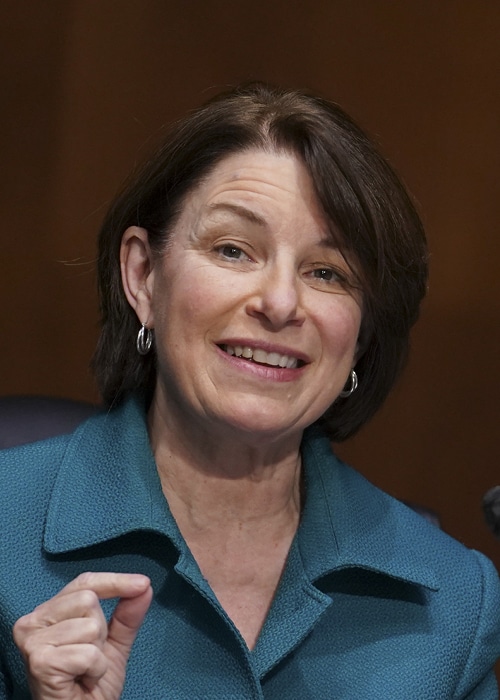
WOMEN OF LIVE
Amy Klobuchar
U.S. Senator
Minnesota
“It was by far the most fun thing I’ve worked on,” Sen. Amy Klobuchar told VenuesNow the day after Congress passed the $15 billion Save Our Stages bill she co-sponsored. In an era of debilitating political polarization and gridlock, Klobuchar, with help from her Republican colleague and bill co-sponsor, Texas Sen. John Cornyn, achieved what seems impossible.
Her success stemmed from recognizing early on the immense common ground the cause of music venues engenders. This she knew intuitively as a music fan who had seen Led Zeppelin, The Cars, Aerosmith and even Prince at the iconic First Avenue in her native Minneapolis. All of which may have come to mind when she received a call on a Saturday night from one of her constituents: Dayna Frank, the owner of First Avenue (see story, Page 22) who was organizing the National Independent Venue Association.
“On a Saturday she called and said, ‘I don’t know how I can make it.’ She knew I was a big fan of First Avenue. I’ve done a bunch of my own events there. We started looking into it and talked about how she was going to have to get this group together. And my No. 1 advice to her was that it had to not just be blue states, it could not just be certain music venues. We had to really reach out, especially to Republican states.”
That winning ethos resulted in the largest arts appropriation bill in U.S. history (which was just upped to $16.125 billion) but also had other unintended benefits. “It was the only time that I passed a bill,” Klobuchar said, “that I was able to quote Bob Dylan on the Senate floor.”
— Andy Gensler

WOMEN OF LIVE
Amy Klobuchar
U.S. Senator
Minnesota
“It was by far the most fun thing I’ve worked on,” Sen. Amy Klobuchar told VenuesNow the day after Congress passed the $15 billion Save Our Stages bill she co-sponsored. In an era of debilitating political polarization and gridlock, Klobuchar, with help from her Republican colleague and bill co-sponsor, Texas Sen. John Cornyn, achieved what seems impossible.
Her success stemmed from recognizing early on the immense common ground the cause of music venues engenders. This she knew intuitively as a music fan who had seen Led Zeppelin, The Cars, Aerosmith and even Prince at the iconic First Avenue in her native Minneapolis. All of which may have come to mind when she received a call on a Saturday night from one of her constituents: Dayna Frank, the owner of First Avenue (see story, Page 22) who was organizing the National Independent Venue Association.
“On a Saturday she called and said, ‘I don’t know how I can make it.’ She knew I was a big fan of First Avenue. I’ve done a bunch of my own events there. We started looking into it and talked about how she was going to have to get this group together. And my No. 1 advice to her was that it had to not just be blue states, it could not just be certain music venues. We had to really reach out, especially to Republican states.”
That winning ethos resulted in the largest arts appropriation bill in U.S. history (which was just upped to $16.125 billion) but also had other unintended benefits. “It was the only time that I passed a bill,” Klobuchar said, “that I was able to quote Bob Dylan on the Senate floor.”
— Andy Gensler
